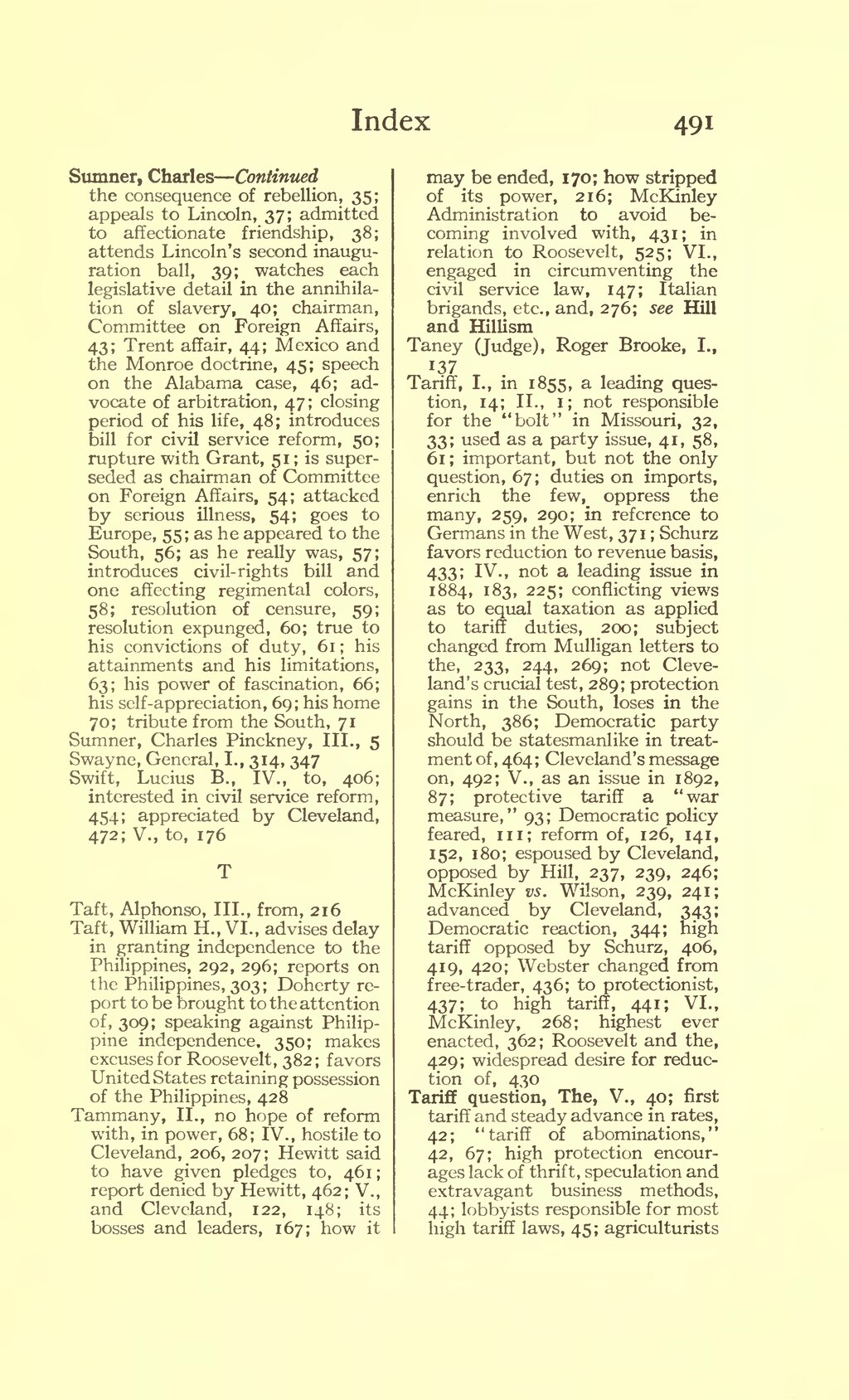Sumner, Charles—Continued
the consequence of rebellion, 35;
appeals to Lincoln, 37; admitted
to affectionate friendship, 38;
attends Lincoln's second inauguration
ball, 39; watches each
legislative detail in the annihilation
of slavery, 40; chairman,
Committee on Foreign Affairs,
43; Trent affair, 44; Mexico and
the Monroe doctrine, 45; speech
on the Alabama case, 46;
advocate of arbitration, 47; closing
period of his life, 48; introduces
bill for civil service reform, 50;
rupture with Grant, 51; is superseded
as chairman of Committee
on Foreign Affairs, 54; attacked
by serious illness, 54; goes to
Europe, 55; as he appeared to the
South, 56; as he really was, 57;
introduces civil-rights bill and
one affecting regimental colors,
58; resolution of censure, 59;
resolution expunged, 60; true to
his convictions of duty, 61; his
attainments and his limitations,
63; his power of fascination, 66;
his self-appreciation, 69; his home
70; tribute from the South, 71
Sumner, Charles Pinckney, III., 5
Swayne, General, I., 314, 347
Swift, Lucius B., IV., to, 406; interested in civil service reform, 454; appreciated by Cleveland, 472; V., to, 176
T
Taft, Alphonso, III., from, 216
Taft, William H., VI., advises delay in granting independence to the Philippines, 292, 296; reports on the Philippines, 303; Doherty report to be brought to the attention of, 309; speaking against Philippine independence, 350; makes excuses for Roosevelt, 382; favors United States retaining possession of the Philippines, 428
Tammany, II., no hope of reform with, in power, 68; IV., hostile to Cleveland, 206, 207; Hewitt said to have given pledges to, 461; report denied by Hewitt, 462; V., and Cleveland, 122, 148; its bosses and leaders, 167; how it may be ended, 170; how stripped of its power, 216; McKinley Administration to avoid becoming involved with, 431; in relation to Roosevelt, 525; VI., engaged in circumventing the civil service law, 147; Italian brigands, etc., and, 276; see Hill and Hillism
Taney (Judge), Roger Brooke, I., 137
Tariff, I., in 1855, a leading question, 14; II., 1; not responsible for the “bolt” in Missouri, 32, 33; used as a party issue, 41, 58, 61; important, but not the only question, 67; duties on imports, enrich the few, oppress the many, 259, 290; in reference to Germans in the West, 371; Schurz favors reduction to revenue basis, 433; IV., not a leading issue in 1884, 183, 225; conflicting views as to equal taxation as applied to tariff duties, 200; subject changed from Mulligan letters to the, 233, 244, 269; not Cleveland's crucial test, 289; protection gains in the South, loses in the North, 386; Democratic party should be statesmanlike in treatment of, 464; Cleveland's message on, 492; V., as an issue in 1892, 87; protective tariff a “war measure,” 93; Democratic policy feared, 111; reform of, 126, 141, 152, 180; espoused by Cleveland, opposed by Hill, 237, 239, 246; McKinley vs. Wilson, 239, 241; advanced by Cleveland, 343; Democratic reaction, 344; high tariff opposed by Schurz, 406, 419, 420; Webster changed from free-trader, 436; to protectionist, 437; to high tariff, 441; VI., McKinley, 268; highest ever enacted, 362; Roosevelt and the, 429; widespread desire for reduction of, 430
Tariff question, The, V., 40; first tariff and steady advance inmates, 42; “tariff of abominations,” 42, 67; high protection encourages lack of thrift, speculation and extravagant business methods, 44; lobbyists responsible for most high tariff laws, 45; agriculturists
